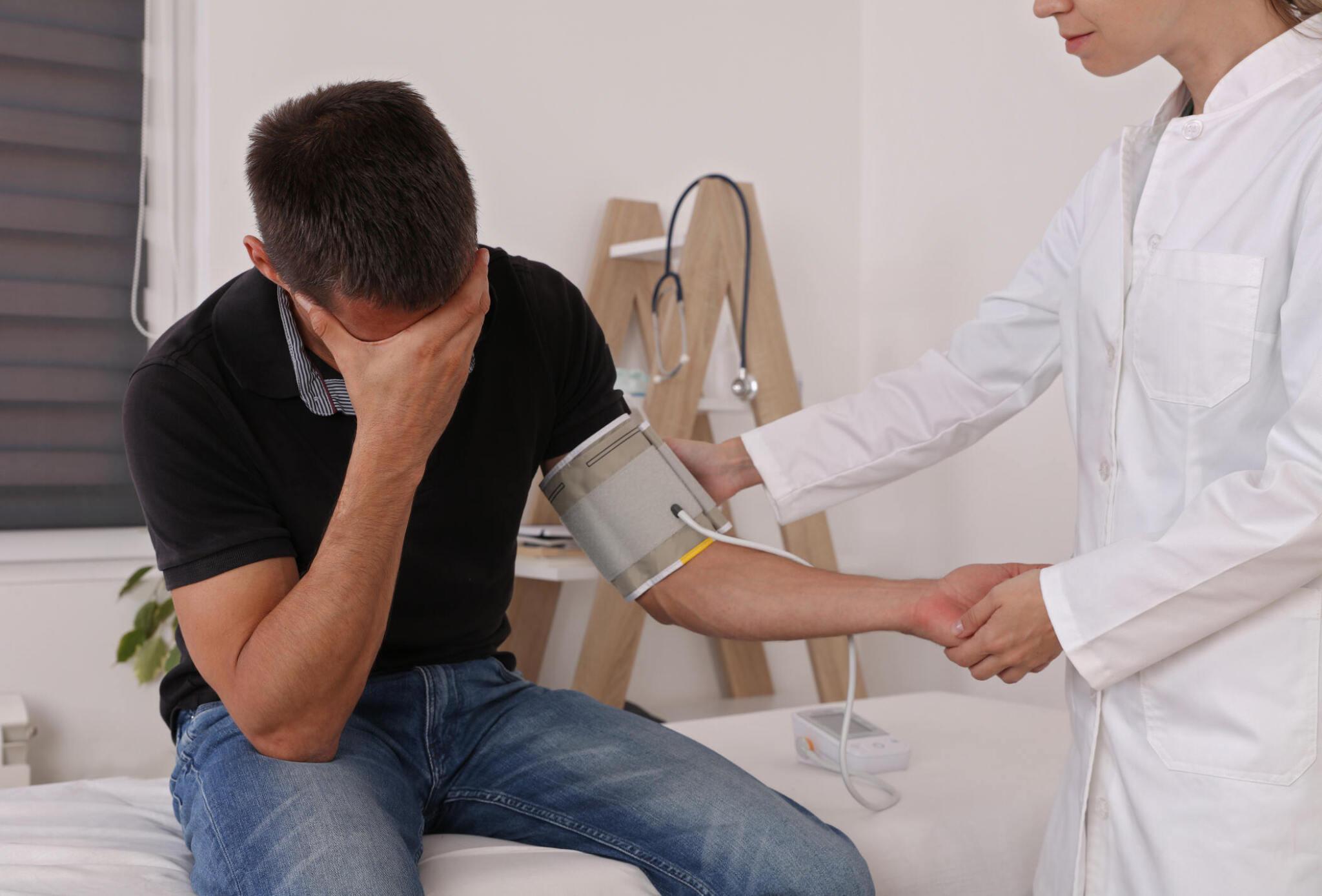
When considering your health, understanding when to go to the hospital for vomiting is crucial. Vomiting, a common symptom, may indicate an underlying issue needing urgent care in Bridgeport, CT. This guide delves into critical scenarios demanding a visit to an urgent care center for vomiting, offering insights into what to anticipate during your hospital visit.
Vomiting, oftenf called “throwing up,” is a natural response to expel substances the body perceives as harmful or irritating. This reflex action helps protect the body from potential threats or discomfort. Vomiting can occur for various reasons, and understanding its causes is essential for appropriate management. Common causes of vomiting include:
Vomiting can respond to viral or bacterial infections affecting the stomach or intestines. These infections irritate the gastrointestinal lining, triggering the body’s defense mechanism.
Consumption of contaminated food or beverages can result in vomiting as the body attempts to eliminate harmful pathogens or toxins from the contaminated items.
Some individuals are prone to vomiting when exposed to motion, such as during car rides, plane flights, or boat trips. This phenomenon, often accompanied by nausea, results from sensory discrepancies that affect the inner ear’s equilibrium.
Morning sickness is a well-known cause of vomiting during pregnancy. Hormonal changes and physiological adjustments in expectant mothers can lead to nausea and vomiting, typically during the early stages of pregnancy.
Certain medications, particularly those that impact the stomach or gastrointestinal tract, may induce vomiting as a side effect. This can include chemotherapy drugs, pain medications, or specific antibiotics.
Overindulging in food or eating too quickly can overwhelm the stomach’s capacity to digest and process the ingested contents. This can result in discomfort and vomiting as the body tries to relieve the excessive gastric pressure.
Before rushing to urgent care in Bridgeport, CT, there are some initial steps you can take at home to address vomiting:
Staying hydrated is crucial when you’re experiencing vomiting. Sip small amounts of clear fluids like water, clear broths, or oral rehydration solutions to prevent dehydration. Dehydration can worsen the effects of vomiting, leading to further discomfort and weakness. By replenishing lost fluids, you can help your body recover more effectively. Taking small sips rather than gulping down liquids is essential, as this is gentler on your stomach and less likely to trigger more vomiting.
When you can’t stop throwing up, it’s crucial to prioritize rest. To give your body a chance to recover, find a comfortable position and lie down. Resting is essential as it reduces the strain on your system and lets your body channel its energy into the healing process. Steer clear of strenuous activities and aim to stay as relaxed as possible. Adequate rest not only aids in recovery but can also help alleviate the feelings of nausea and discomfort often linked to vomiting.
During episodes of vomiting, it’s essential to give your digestive system a break by avoiding solid foods until the vomiting subsides. Solid foods can be difficult to digest, triggering further nausea and vomiting. Opt for a bland diet once you feel ready to eat again, starting with easily digestible foods like plain rice, applesauce, or plain crackers. Gradually reintroduce solid foods as your stomach tolerates them.
Ginger is a natural remedy known for its anti-nausea properties. You can consume ginger in the form of ginger tea or ginger candies. Ginger helps soothe the stomach and alleviate nausea, making it a valuable tool for managing vomiting. Ginger tea can be made by steeping fresh ginger slices or using ginger tea bags. Sip it slowly to reap the full benefits of its calming effects on your stomach.
Peppermint is another effective option for calming the stomach during episodes of vomiting. You can try peppermint tea or peppermint candies to alleviate nausea. Peppermint’s menthol content has a soothing effect on the digestive system and can help reduce feelings of nausea. Peppermint tea is easy to prepare by steeping peppermint leaves or using pre-packaged tea bags. The pleasant aroma and taste of peppermint can provide comfort and relief from the discomfort associated with vomiting.

If you’ve assessed your situation and identified any of the following signs, it’s time to consider visiting a trusted urgent care facility in Bridgeport, CT, like DOCS Urgent Care & Primary Care.
When you find yourself in a situation where you are vomiting continuously for an extended period, it is imperative to seek medical assistance promptly. Continuous vomiting can lead to dehydration, a condition where your body loses excessive fluids. This can result in several issues, such as an unrelenting thirst, dryness in your mouth and skin, darkening of urine, and feelings of dizziness. Urgent care centers are well-prepared to address this condition effectively by providing vital fluids and treatments to assist in your recovery.
If you can’t stop throwing up, it’s vital to take action. Discovering blood in your vomit can be distressing and requires immediate medical attention. This occurrence might indicate a more severe problem, possibly bleeding in your digestive tract. Urgent care centers like DOCS Urgent Care & Primary Care, can conduct diagnostic tests that can accurately identify the source of the bleeding. This enables them to promptly begin the most appropriate treatment, effectively addressing your concerns and safeguarding your health.
Knowing when to go to the hospital for vomiting is crucial. If you have intense abdominal pain, accompanying vomiting could signal underlying medical issues such as appendicitis, gallbladder problems, or intestinal blockages. In such cases, it’s advisable to visit urgent care facilities. They can perform thorough evaluations and utilize advanced imaging techniques to pinpoint the root cause of your abdominal discomfort. This proactive approach ensures a timely diagnosis and the right treatment to efficiently relieve your pain and discomfort.
When you can’t stop throwing up, it’s essential to be vigilant. A high fever and vomiting could indicate an infection or an underlying health concern that demands prompt attention. Proficient urgent care professionals possess the capability to carry out diagnostic tests, effectively identifying the source of the fever. Once the underlying problem is determined, they can suggest and administer the requisite treatments to address it, relieving your symptoms and fostering your overall health and well-being.
Symptoms such as confusion, fainting, or severe headaches should not be underestimated and should prompt immediate evaluation. Urgent care centers in Bridgeport, CT, are equipped to assess these neurological symptoms and determine whether they necessitate further medical attention. Their prompt assessment ensures that you receive the appropriate care promptly, addressing any potential neurological concerns comprehensively to safeguard your health and peace of mind.
Understanding the distinction between urgent care and the emergency room is essential for making informed healthcare decisions. While both provide critical medical services, they serve different purposes and cater to specific medical needs.
Urgent care centers are specifically designed to handle non-life-threatening medical issues that require immediate attention but are not categorized as emergencies. They fill a vital gap between primary care physicians and the emergency room, offering a more accessible and cost-effective option for certain medical conditions. Urgent care is particularly valuable for cases like vomiting that, while requiring prompt attention, do not pose an immediate threat to life.
There are compelling reasons to consider urgent care when facing vomiting episodes:
Urgent care centers offer several advantages in terms of convenience. They typically boast shorter wait times and more flexible operating hours than emergency rooms. This means you won’t have to endure lengthy waits when you feel unwell, and you can seek medical attention even during evenings or weekends. This accessibility ensures that you receive the care you need promptly, helping to alleviate discomfort and address your health concerns sooner rather than later.
Urgent care is often a more cost-effective option than heading to the emergency room, especially when dealing with non-life-threatening conditions like vomiting. This cost-efficiency can be a significant relief, particularly if you have health insurance with lower co-pays for urgent care visits. It allows you to access necessary medical care without hefty expenses, making healthcare more accessible and affordable.
Urgent care providers are well-prepared to handle various medical issues, including conditions like vomiting, without the extreme urgency of emergency room visits. Their expertise in managing urgent yet non-emergent cases ensures that you receive focused and efficient care tailored to your health needs. This specialization enables them to address your concerns effectively and comprehensively.
Urgent care facilities prioritize prompt care for urgent but not life-threatening conditions, such as vomiting. As a result, you can anticipate being seen by a healthcare professional and receiving treatment more rapidly than going to the emergency room, where critical, life-threatening cases understandably take precedence. This commitment to faster access to care ensures that your health issues are addressed on time, providing you with the relief and treatment you need as soon as possible.
While urgent care is a suitable option for many vomiting cases, it’s crucial to recognize situations that warrant an immediate visit to the emergency room. Here are signs and symptoms that indicate the ER is the right choice:
If you or a loved one experiences intense, crushing chest pain, it could indicate a heart attack, a life-threatening condition requiring immediate attention.
Severe breathing can indicate a serious respiratory issue, such as a severe asthma attack or a pulmonary embolism, necessitating immediate intervention.
Head injuries with symptoms like loss of consciousness, confusion, severe headache, or bleeding should be evaluated in the emergency room to rule out any significant neurological issues or intracranial bleeding.
Seizures can be caused by various underlying conditions, and their severity can vary. However, any seizure lasting more than a few minutes or recurring should be evaluated promptly in the ER.
Anaphylaxis, a severe and life-threatening allergic reaction, requires immediate medical attention. Symptoms may include difficulty breathing, swelling of the face and throat, and a drop in blood pressure.

Knowing what to anticipate during your visit to an urgent care facility in Bridgeport, CT, such as DOCS Urgent Care & Primary Care – Bridgeport, can help ease any anxiety and streamline your experience. Here’s an overview of the typical process:
Upon arrival at the urgent care center, your first step is to check in at the front desk. Be prepared to provide your identification and insurance information. This initial process ensures that your visit is documented accurately.
After checking in, a nurse or healthcare professional will assess the urgency of your condition. They will determine the order in which patients are seen, with those requiring immediate attention receiving priority. This triage process helps ensure that the most critical cases are addressed promptly.
Once you are called in for your examination, a healthcare provider will assess your condition. They will ask questions about your symptoms, medical history, and any relevant information that can aid in the diagnosis. This thorough evaluation is vital in determining the appropriate course of action.
Depending on the nature of your symptoms, the healthcare provider may recommend diagnostic tests to further assess your condition. These tests may include blood work, X-rays, or other imaging studies. These tests assist in confirming the diagnosis and guiding treatment decisions.
Following a diagnosis, you will receive the necessary treatment. This may involve medication prescriptions, intravenous (IV) fluids, wound care, or other medical interventions. The treatment plan is tailored to address your specific needs and aims to alleviate symptoms and promote recovery.
Before concluding your visit, the healthcare provider will discuss follow-up instructions with you. They will explain any necessary steps for ongoing care, such as when to see your primary care physician or if additional visits to the urgent care center are needed. Clear guidance ensures that you continue on the path to recovery effectively.
Many urgent care centers in Bridgeport offer the convenience of scheduled appointments and walk-in services. Making an appointment can reduce wait times and ensure a more predictable visit. However, walk-ins are typically accommodated for immediate needs, allowing patients to receive timely care without prior scheduling.
Diagnostics are fundamental in pinpointing the underlying cause of vomiting, allowing healthcare providers to make informed decisions about treatment and management. Several diagnostic tools and tests may be employed to gain a comprehensive understanding of the issue:
Blood tests are valuable for uncovering potential causes of vomiting. They can reveal infections, such as bacterial or viral gastroenteritis, as well as electrolyte imbalances, which are common in cases of dehydration. Additionally, blood tests can indicate signs of organ dysfunction, such as liver or kidney problems, helping guide the diagnostic process.
Imaging studies like X-rays or CT scans are essential for visualizing the abdominal region and identifying structural issues or blockages within the digestive system. X-rays can detect conditions like intestinal obstructions or the presence of foreign objects that may be causing the vomiting. CT scans offer more detailed images, enabling a more precise diagnosis in complex cases.
In certain scenarios, a urinalysis may be requested to evaluate kidney function and identify potential dehydration-related issues. Changes in urine color, clarity, and the presence of specific compounds can provide valuable insights into the patient’s overall health and hydration status.

During your visit to an urgent care facility for vomiting, engaging with your healthcare provider and seeking clarity on various aspects of your condition and treatment plan is essential. Here are some important questions you might consider asking:
Understanding the underlying cause of your vomiting is crucial for effective treatment and preventing future episodes. Your healthcare provider can provide insights into the potential causes.
It’s essential to have a clear understanding of the proposed treatment plan. Ask about specific medications, therapies, or interventions that will be used to address your vomiting.
Being aware of potential side effects or risks associated with the prescribed treatment allows you to make informed decisions about your healthcare. It also helps you recognize any adverse reactions that may occur.
Understanding the follow-up plan is essential for monitoring your recovery. Ask about the recommended timeframe for a follow-up appointment and whether you should see a specialist or your primary care physician.
Inquire about home care strategies or lifestyle modifications that complement your treatment plan. This may include dietary adjustments, hydration guidelines, or self-care practices to expedite recovery.
Recognizing when to seek urgent care for vomiting is crucial for your overall health and well-being. Although some instances of vomiting can be addressed at home, persistent or severe symptoms demand immediate medical attention. Awareness of the indicators that necessitate urgent care empowers you to make informed choices when the situation demands it. It’s important to remember that urgent care facilities, like DOCS Urgent Care & Primary Care – Bridgeport in Bridgeport, CT, can offer timely assistance and guide you toward a swift recovery. Don’t hesitate to contact us when needed to ensure your well-being.
Take action now. If you or a loved one is experiencing severe or persistent vomiting, visit DOCS Urgent Care & Primary Care – Bridgeport for prompt and compassionate care. Your health is our priority.


During this surge in COVID-19 cases, our primary focus is meeting the high demand for tests, and we are seeing higher than usual wait times. This means we are unable to answer most phone calls. Please know that our teams are working very hard during this time to care for as many patients as safely as possible. Please click the button below for answers to common questions. We appreciate your understanding.